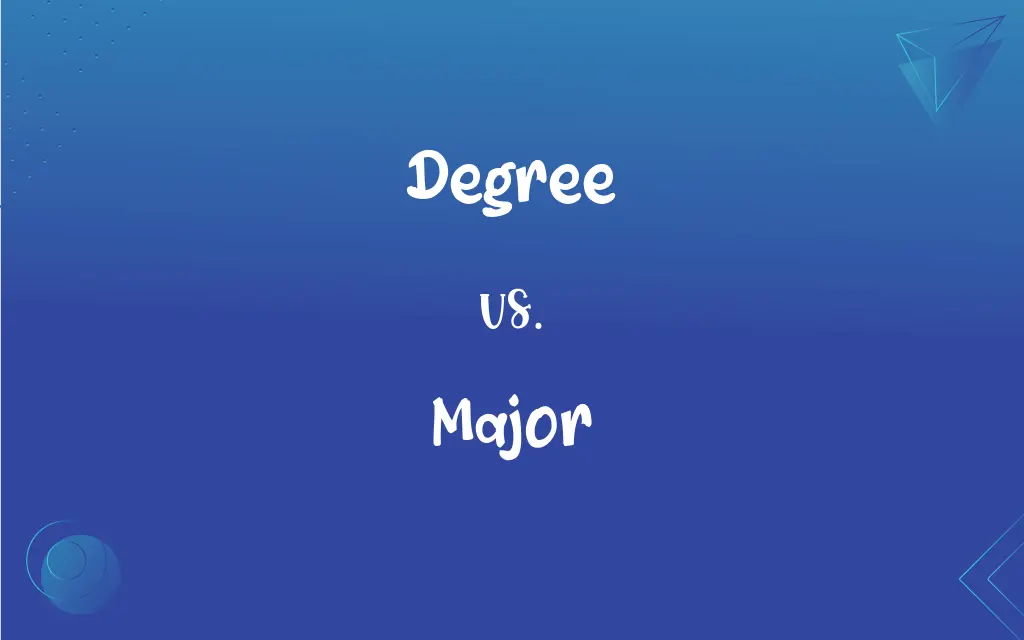Degree vs. Major: What's the Difference?
Edited by Aimie Carlson || By Janet White || Published on March 27, 2024
Degree is an academic award or qualification obtained after completing a course of study at a college or university. Major is a specialized field of study chosen by a student within a degree program.

Key Differences
A degree is an academic credential awarded by a college or university upon the completion of a prescribed set of courses and requirements. It signifies the level of education a person has achieved in a general or specific field. In contrast, a major is a specific area of focus or specialization within a degree program. It determines the core subject area that a student focuses on during their academic studies.
Degrees are categorized by levels such as bachelor's, master's, and doctoral degrees, each with its own set of general and specific requirements. The major, however, refers to the concentrated study in a particular discipline or field, such as biology, history, or engineering, forming the central component of a student's academic experience within their degree program.
Earning a degree typically requires completing a combination of core, elective, and major-specific courses. The degree reflects the broader educational experience, including the depth and breadth of study. On the other hand, a major is more focused, requiring students to take a series of related courses in a specific subject area to gain in-depth knowledge.
The degree indicates the overall scope and level of a student's academic achievement, while the major is more about depth in a specific area of interest. For instance, a student may earn a Bachelor of Science (degree) with a major in computer science, where 'Bachelor of Science' is the degree, and 'computer science' is the major.
Both degree and major are integral to higher education, the degree encompasses the total educational curriculum, and the major focuses on a specific field of study within that curriculum, defining a student's primary area of academic and professional expertise.
ADVERTISEMENT
Comparison Chart
Definition
Academic qualification or award
Specialized field of study within a degree
Focus
Overall academic achievement
Concentrated study in a particular area
Examples
Bachelor's, Master's, Doctoral degrees
Biology, History, Engineering majors
Requirements
Core, elective, and major-specific courses
Series of courses in a specific subject
Outcome
Broad educational experience
In-depth kn
ADVERTISEMENT
Degree and Major Definitions
Degree
Broad area of academic study.
Her degree in Business covers various subjects.
Major
A student's chosen primary area of study.
Her major is in Biochemistry.
Degree
A formal recognition of academic achievement.
She received her degree in Architecture.
Major
The main focus within an academic degree.
She switched her major to Computer Science.
Degree
An official document certifying completion of studies.
Her engineering degree was awarded last spring.
Major
The specific subject a student specializes in.
Her major in Graphic Design is part of her Arts degree.
Degree
Earned after completing required courses and exams.
After four years, he earned his degree.
Major
A series of related courses in a specific subject.
His major involves intensive study in Mathematics.
Degree
Represents a level of education, such as bachelor's or master's.
He is pursuing a master's degree in Psychology.
Major
Concentrated study within a broader degree program.
He declared his major as Economics.
Degree
One of a series of steps in a process, course, or progression; a stage
Proceeded to the next degree of difficulty.
Major
Greater than others in importance or rank
A major artist.
Degree
A step in a direct hereditary line of descent or ascent
First cousins are two degrees from their common ancestor.
Major
Great in scope or effect
A major improvement.
FAQs
What is a major?
A specialized area of study within a degree program.
How does a major differ from a degree?
A major is a specific focus area, while a degree is the overall academic qualification.
Can you change your major?
Yes, students often change their major during their studies.
How many majors can you have?
Typically one, but some students pursue double majors.
How important is choosing the right major?
Very, as it can influence your career path and interests.
What if you can't decide on a major?
Students can start as undeclared and choose a major later.
Do all degrees require a major?
Most bachelor's degrees do, but some degrees, like certain associate's degrees, may not.
Do master's degrees have majors?
Not usually; they focus on a specific field of study.
What is a degree?
An academic qualification awarded by a college or university.
How long does it take to complete a degree?
Typically, bachelor's degrees take 3-4 years, master's 1-2 years.
Can you complete a degree without a major?
In some educational systems, yes, but it's uncommon.
Do employers look at your major?
Yes, especially if it's relevant to the job.
Is a major the same as a minor?
No, a minor is a secondary focus area, less comprehensive than a major.
Do you declare a major in community college?
In some cases, especially if transferring to a four-year program.
Can you have multiple majors?
Yes, though it may require more coursework.
Can a major affect your salary?
Potentially, depending on the field and job market.
Can you change your degree?
Changing degrees often means starting over or shifting to a related program.
Is a professional degree the same as a major?
No, a professional degree is a type of degree focused on preparing for a specific profession.
What's more important, the degree or the major?
Both are important, as the degree reflects the level of education, and the major indicates specialization.
Is the major listed on the degree certificate?
Usually, yes, it's mentioned alongside the degree title.
About Author
Written by
Janet WhiteJanet White has been an esteemed writer and blogger for Difference Wiki. Holding a Master's degree in Science and Medical Journalism from the prestigious Boston University, she has consistently demonstrated her expertise and passion for her field. When she's not immersed in her work, Janet relishes her time exercising, delving into a good book, and cherishing moments with friends and family.
Edited by
Aimie CarlsonAimie Carlson, holding a master's degree in English literature, is a fervent English language enthusiast. She lends her writing talents to Difference Wiki, a prominent website that specializes in comparisons, offering readers insightful analyses that both captivate and inform.







































































